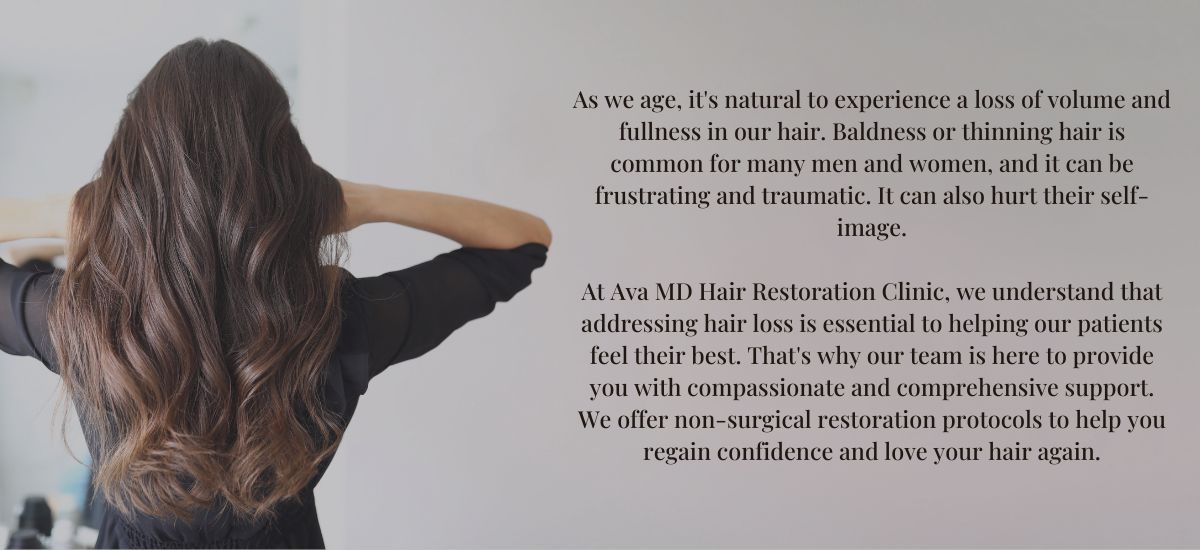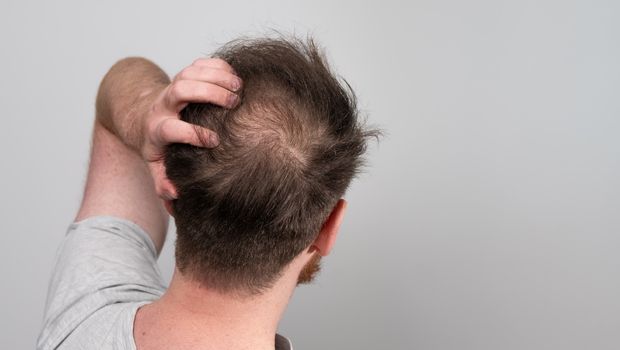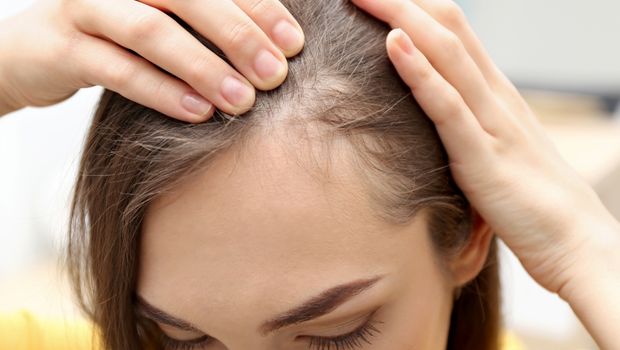
Specialized Protocols for Hair Restoration at Ava MD
Ava MD hair restoration specialists utilize cutting-edge techniques to provide effective hair restoration procedures. Dr. Shamban and the Ava MD providers employ extensive research to identify the most effective hair loss treatments. Together as an innovative team, we are dedicated to help you look and feel good again.
To best support all of our patients who suffer from hair loss, we have developed several state-of-the-art protocols. These hair restoration options for men and women include:
- Light Therapy: Red light wavelengths have been found to reduce inflammation in the skin and increase blood circulation around hair follicles on the scalp. This reduces and hair loss and helps to stimulate regrowth
- Minoxidil: More commonly known as Rogaine, the first FDA approved treatment for hair loss can be applied directly to the scalp or balding area to prevent further hair loss and stimulate regrowth. We also offer an oral option of this medication.
- Finasteride: Also known as Propecia, Finasteride is used to treat hair loss by blocking a hormone in the scalp that causes male pattern baldness.
- Bimatoprost: Under the care of an Ava MD provider, bimatoprost can be applied to the scalp for hair restoration, leveraging its potential benefits in promoting hair growth with expert guidance and supervision.
- Microneedling with Biological Growth Factors: Microneedling with biological growth factors stimulates blood supply and provides proper nutrients to hair follicles. This can help restore the hair growth process to those experiencing hair loss.
- HydraFacial Keravive: This three-step treatment is designed to cleanse, stimulate, and hydrate the scalp to promote growth and fullness. This treatment works to improve your scalp health to enhance the quality of your hair.
- Keralase: A hair and scalp treatment that contains a unique and proprietary formulation. This one-of-a-kind topical serum contains five bioidentical growth factors and two skin proteins, essential for scalp and hair health.
Hair Loss Impacts Everyone
It’s totally normal to see some hair shedding every day. In fact, we shed around 50 to 100 hairs daily, especially on days when we wash our hair. But some of us might experience a hair-shedding spree, resulting in more hair falling than usual into the shower drain, on the comb, or on the pillow. When shedding outpaces growth, a thinning of the hair begins to affect the entire scalp.
Here are just a few of the reasons you could have sudden hair loss:
Male Pattern Baldness
Male pattern baldness (androgenic alopecia) is the most common type of hair loss found in men. Approximately 25% of men with hereditary male pattern baldness start losing their hair before the age of 21 and by age 35, approximately 66% of men in general will experience some degree of hair loss in general.
Men who experience hair loss tend to develop a receding hairline and bald spots. This can be extremely detrimental to men’s self-esteem, as a 2019 study in the International Journal of Trichology found that male pattern baldness lowered the quality of life for many men, affecting their self-esteem and confidence.


Female Pattern Baldness
Female pattern baldness (which is also known as androgenic alopecia) is the most common type of hair loss found in women. Women who experience female pattern baldness report general hair thinning, which affects the overall volume of their hair. For most women, female pattern baldness begins midlife, but some women may experience it earlier.
While alopecia can affect any age group, it occurs most commonly after or during menopause. This loss of hair and volume is not always constant and tends to occur sporadically. Many women report the first signs of their hair loss as a widening part or a feeling that their hair does not feel as thick as usual. In fact, though the scalp may become more visible, the hairline does not typically recede in women.
While few people experience hair loss in their 20s or 30s, it can occur in both women and men. However, it can be isolating due to stigma, which means people often delay seeking treatment. Delayed treatment can lead to pronounced hair loss by the time help is sought. It is essential to seek. That’s why it is essential to seek professional diagnosis and treatment as soon as possible.
Types of Hair Loss Commonly Affecting Men and Women
Generally, people lose 50-100 hairs per day as a part of the natural life cycle of hair. However, if this cycle is disrupted or the hair follicle is damaged, hair may begin to fall out prematurely. Hair loss can be linked to a person’s genetics, though there may also be medical and/or behavioral conditions that interrupt the growth cycle. At the Ava MD Hair Restoration Clinic, we specialize in both hair and scalp disorders to help you identify the root cause of your hair loss.
There are several reasons why you might experience hair loss, including:
- Androgenetic Alopecia: A common form of hair loss in both men and women. The hair is lost in a well-defined pattern above the temples, forming a characteristic “M” shape in men and diffuse thinning in women.
- Alopecia Areata: A sudden, unpredictable form of hair loss that begins with one or more circular patches around the scalp.
- Telogen Effluvium: A common and often temporary cause of hair loss due to excessive shedding of resting (telogen) hair that comes after a shock to the body, such as injury, illness, rapid weight loss, or the post-partum period. However, once the cause of the hair loss is addressed, new hair is expected to grow. Patterns are unpredictable and differ greatly.
- Anagen Effluvium: The most common type of hair loss in patients of any age, sex, or race, receiving chemotherapy. This type of hair loss involves hair shedding during the growth (anagen) stage of the hair cycle. This is an abnormal, rapid loss of hair with an unpredictable pattern. Growth typically begins quickly after chemotherapy or exposure to the cause is removed. Changes to color and texture are sometimes noted.
There are other causes of hair loss, including:
- Illness: Stress, diabetes, low thyroid activity, nutritional deficiency, anemia, lupus, cancer, or even the flu can cause temporary hair loss. However, it’s important to note that in most cases, if the health condition is addressed or managed, the hair is expected to return.
- Trauma: Tissue damage and scarring caused by burns, cosmetic surgeries, physical injuries can damage the hair follicles. This has the potential to interfere with hair growth and cause permanent hair loss.
- Medication: Hair loss from medication tends to be reversible and non scarring hair loss occurs within days to weeks of starting a new medication or changing the dose.
Effective treatment for hair loss begins with finding the root cause. To pinpoint the cause of your hair loss, it’s important to work with a professional to receive an accurate diagnosis. The experts at Ava MD have in-depth knowledge about the many causes of hair loss and the expertise needed to treat the diverse causes.
Hair Restoration Protocols Based On Your Unique Needs
If you’re tired of living with hair loss, you’ve come to the right place. We have years of experience treating male and female pattern baldness, alopecia, and hair thinning by working to find the best solution for you. This involves a customized treatment plan for each and every individual patient.
- Pre-Treatment:
-
- Our pre-treatment evaluation is dedicated to determine the cause of your hair loss. Before making a diagnosis, your Ava MD specialist will likely give you a physical exam, order blood tests and ask about your diet, hair care routine, and your personal and family medical history.
- In-office treatments:
-
- Effective treatment depends entirely on the type of hair loss you are experiencing; in some conditions, patients may be able to regrow hair without treatment (such as hair loss from medication) and in others, medications and/or injection may be necessary.
- Maintenance:
-
- After treatment, we will work with you to develop a hair care routine that will maintain your results. It’s important to consider your habits for long-term success. Following an individually designed at-home routine is important to maintain your results from the in office treatments.
Results from the Ava MD Hair Restoration Clinic
Ava MD utilizes the most innovative dermatological techniques and technology to deliver our clients highly effective, natural-looking results. Most patients will see results between 6-9 months after treatment.
Our treatment plans are designed to stimulate hair growth in the scalp while reducing hair loss. Because we focus on rejuvenating the hair follicles and stimulating new hair growth, we’re able to potentially extend the life cycle of your hair, increase hair count, and improve the thickness of the hair growing in.
Hair Loss Facts:
- The scalp has about 100,000 hairs in various stages of growth, rest, shedding, and regeneration.
- The hair growth cycle consists of four distinct phases with their own timeline.
- These can be affected by age, nutrition, and your overall health.
The stages of hair growth:
- The Anagen Phase: During anagen, the hair grows actively. This stage may last several years.
- The Catagen Phase: During catagen, the hair stops growing and separates from the follicle, which holds the hair in place. This stage takes about 10 days.
- The Telogen Phase: During telogen, the follicle rests for 2-3 months, after which the hair falls out. Afterward, the anagen phase begins anew.
- The Exogen Phase: During the exogen phase (which is an extension of the telogen phase), the hair is shed from the scalp. This process is often helped by washing or brushing your hair.
Booking Your Appointment
To learn more about our hair loss treatment options, book an appointment with an Ava MD provider at our in-house Hair Restoration Clinic. Contact us online or call us at our Beverly Hills office at 310-843-9915 or our Santa Monica office at 310-828-2282.